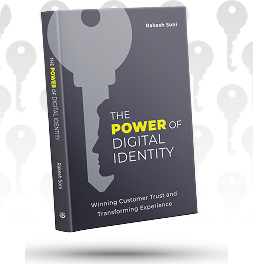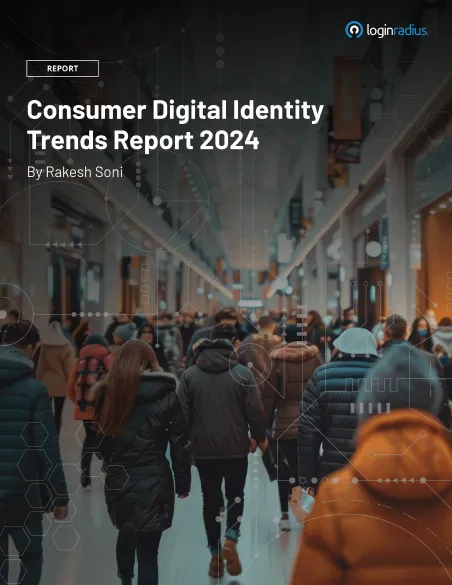Consumer Data Protection: How to Handle Data Breaches in Your Business
With the increasing number of data breaches across the globe, securely managing consumer data is becoming more crucial than ever before. Here are some efficient ways for consumer data protection that every online business must emphasize to ensure a secure line of defense against cyber-attacks.


Learn How to Master Digital Trust

The State of Consumer Digital ID 2024

Top CIAM Platform 2024
While the internet becomes the second home for most of us amid the global pandemic, there’s a substantial increase in the number of data breaches worldwide.
It doesn’t matter if you’ve heard of bigger breaches in the news, you shouldn’t assume that your industry or businesses can't be on attackers’ radar.
According to Verizon's breach report, 71 percent of breaches are usually financially motivated, which means the main motive is to exploit user data or privacy for financial benefits.
Cybercriminals are exploiting consumer data of big brands and even startups that have recently stepped into the digital world.
Regardless of the size of a business, one should consider adequate measures to strengthen the first line of defense, especially the ones offering digital platforms for buyers and subscribers.
Let’s learn the most efficient ways for consumer data protection that every online business must emphasize during these uncertain times.
Why Is Consumer Data Protection Now Crucial Than Ever Before
Consumers are the main reason for your business continuity, which is perhaps the most important reason to protect their data.
In an era where competitors are just a click away, businesses can’t play with fire when it comes to losing consumer confidence that mostly happens when their privacy is breached.
On top of it, specific data privacy and security laws including the General Data Protection Regulation (GDPR) and the California Consumer Privacy Act (CCPA) that ensures that a business protects consumer data.
As far as GDPR is concerned, it requires businesses that collect data on EU citizens regardless of their present location must implement industry-standard measures for data protection. Failing to do so, the company would have to bear hefty fines.
The same goes in the case of CCPA. If a company operating in California needs to collect data from California residents, it must comply with CCPA regulations, else, heavy fines can be imposed.
Most businesses fail to comply with these compliances and end up tarnishing their brand repute in the global markets.
Most Common Data Breaches that Businesses Face
Before diving into the ways to protect consumer data, let’s quickly understand what some common data breaches in a business are.
- Cyber Attacks: Any unauthorized practice to sneak into a company’s network that results in data theft can be categorized under cyber-attacks.
- Human Error: The unintentional actions or a lack of action by an employee that causes data theft or unauthorized access to sensitive information.
- Phishing Attacks: It’s an online scam where cyber criminals impersonate legitimate organizations through advertisement, text message, or email.
- Malware Attacks: A malicious software is installed on the victim’s computer through a fraudulent email containing a link, which further breaches the security of an organization.
- Employee Data Theft: Sometimes employees with access to sensitive information may expose the information to competitors or cybercriminals against monetary benefits.
Also Read: How LoginRadius Future-Proofs Consumer Data Privacy and Security
How to Handle Data Breaches in Your Business?
Since security is a culture, it’s crucial to emphasize the key elements that can help you secure your consumers’ data more reliably. Let’s learn how.
1. Get a Consumer Identity and Access Management (CIAM) Solution in Place
A CIAM solution could be the biggest weapon in protecting your consumers’ identities and their data.
Many enterprises are leveraging a CIAM solution that offers high-end data encryption while the data is managed, stored, and retrieved. This increases the overall defense line against any kind of unauthorized attacks by cybercriminals.
Moreover, a cloud-based CIAM solution can easily handle millions of identities, and that too without hampering the user experience.
Businesses must consider a cloud-based CIAM solution that not only enhances data and privacy security through compliances but eventually delivers a flawless user experience.
2. Schedule Employee Training
As already discussed, security being a culture, businesses can’t ignore the importance of cyber awareness training for their employees.
Cybersecurity training is crucial, especially in an era when there are dozens of new ways to breach security and are being practiced to exploit employees and the company’s data.
Not to forget the newly-established remote working ecosystem that has provided enough opportunities to the cybercriminals that are always on the hunt for new targets by bypassing weaker defense systems.
Frequently training employees regarding the new possible ways of cyber-attacks can greatly help in strengthening the company’s overall defense system.
3. Add Layers of Authentication
Multi-factor authentication (MFA) could be the finest option to enhance the overall security within a network.
Employees or consumers need to authenticate and need to provide a one-time password (OTP), which they receive on email or as a text on phone to verify that they are the real owner of an identity.
Also, risk-based authentication can do wonders to reinforce the security layer of a business as it demands authentication whenever some suspicious activity is performed by any user.
Final Thoughts
Securing consumer data is now crucial more than ever before as cybercriminals are already bypassing weak defense systems.
As discussed earlier, a compliance-ready CIAM solution with security features like multi-factor authentication, single-sign-on, and risk-based authentication is stringently the need of the hour.
Moreover, companies that aren’t focussing on employee training must immediately put their best foot forward to organize cyber awareness training programs to minimize the risk of human error.


